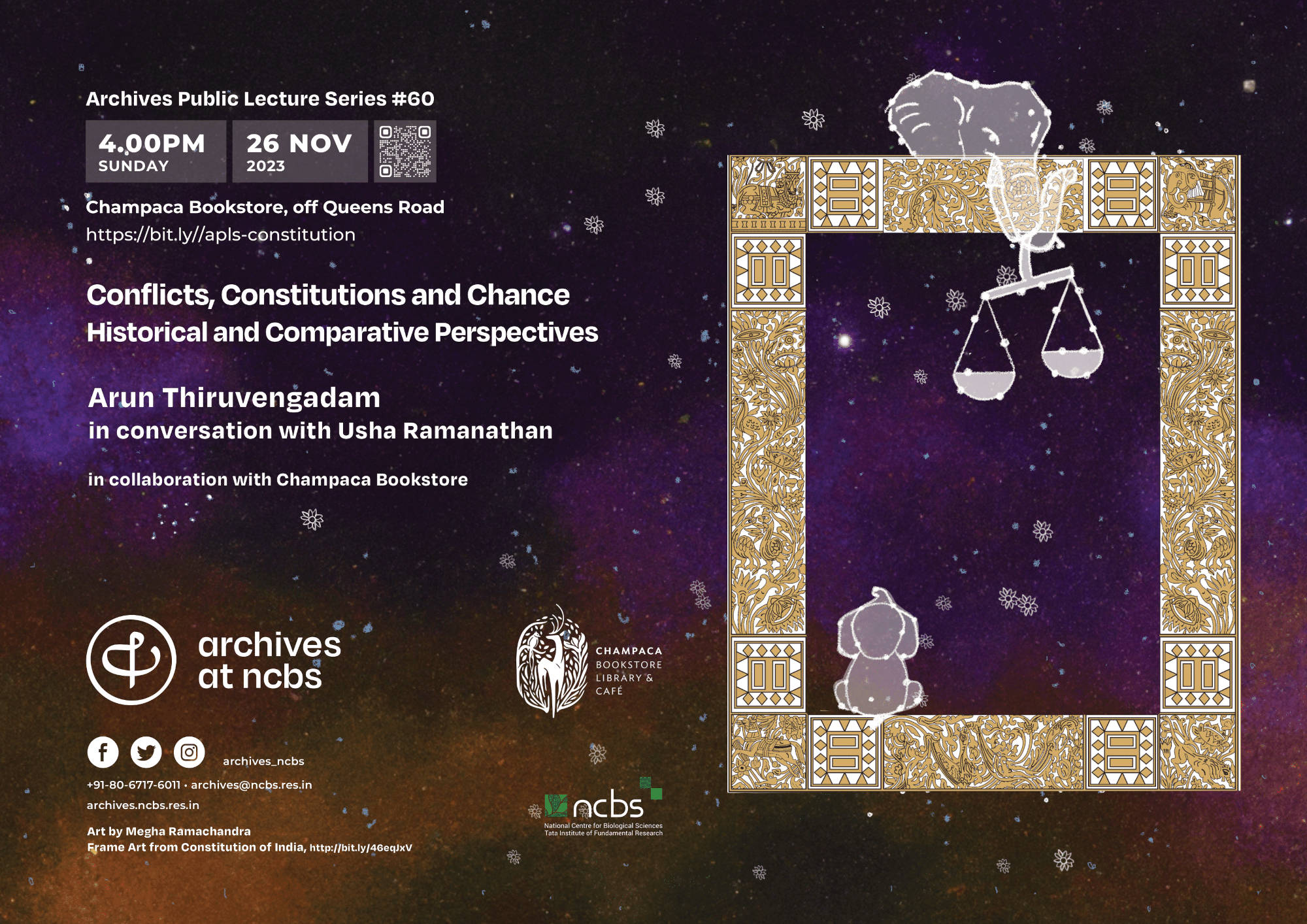Archives at NCBS : Events - Conflicts, Constitutions and Chance
Archives at the National Centre for Biological Sciences
Public Lecture Series
60th edition
Monthly talks framed around explorations in and around archives. Discussions by artists, archivists, academics, lawyers, teachers, journalists and others.
Conflicts, Constitutions and Chance
Historical and Comparative Perspectives
Arun K Thiruvengadam
in conversation with Usha Ramanathan
Sunday, Nov 26 2023. 4:00pm.
Champaca Bookstore, off Queens Road
Details: https://bit.ly/apls-constitution
in collaboration with Champaca Bookstore
Accessibility: The venue is accessible only via a single flight of stairs

Abstract:
Ours is an era of war. To those who hold to the conventional view of constitutions, this is a state of affairs that induces great despair. This conventional view takes the stance that the history of the modern era is a linear progression from monarchical and feudal systems towards modes of constitutional democracy. Relying on recent historical and comparative work, I seek to complicate this somewhat rosy view of constitutions, and highlight how some of the earliest constitutions were in fact inextricably interlinked with militaries and military heroes. The rise of constitutions went hand in glove with the rise of empires across the 18th and 19th centuries, and constitutions were not always pacifist documents.
This is an important corrective but also provides us hope when we think of ways of understanding the ‘crisis of constitutionalism’ that we are living through. Across the world, the emergence and rapid rise of populist figures and forces across the last two decades seems to herald the end of the era of constitutions. But, if we are mindful of these historical insights, we will shed the romantic image of constitutions and see them for what they are: constructs of human imagination and effort that carry all the flaws and limitations that accompany human-made products. This analysis has implications for the future of the Indian version of constitutionalism, which we will explore together in the discussion following the initial presentation.
Bio:
Arun Thiruvengadam is a Professor of Law at the National Law School, Bangalore. He holds law degrees from the National Law School and the New York University School of Law. After enrolling as a practicing lawyer in 1995, he served as a law clerk to Chief Justice A. M. Ahmadi at the Supreme Court of India till March 1997. He practiced as a lawyer before the High Court of Delhi and the Supreme Court of India till 1999 before commencing graduate studies and pursuing an academic career. He teaches and researches primarily on Indian constitutional and administrative law and comparative constitutional law. He is the author of The Constitution of India: A contextual analysis (Bloomsbury India, 2018) among other works.
Usha Ramanathan works on the jurisprudence of law, poverty and rights. She researches, writes and speaks on issues that include the nature of law, Bhopal Gas Disaster, mass displacement, eminent domain, manual scavenging, civil liberties including the death penalty, beggary, criminal law, custodial institutions, the environment, judicial process. Ramanathan has been tracking, and engaging with, the Indian national ID project and has written, and debated extensively, on the subject. She has been writing and debating issues of technology and the human conditions of freedom and liberty over the years. She has served as a member of diverse expert committees, including one for privacy set up in the Planning Commission of India, one for the Human DNA Profiling Bill set up in the Department of Biotechnology, and one for studying the socio-economic status of tribal communities set up by the Prime Minister's Office. For her body of work, in 2019, Usha Ramanathan was awarded Access Now's Human Rights Heroes Award.


